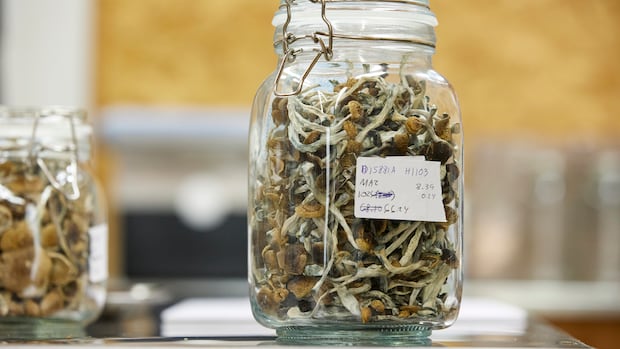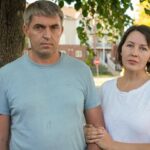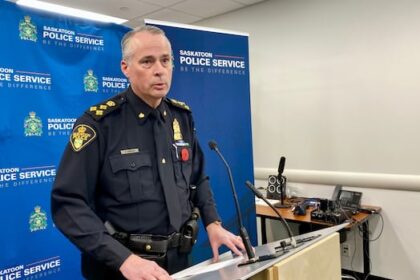OttawaResearchers in Kingston, Ont., are embarking upon a clinical trial that will look at whether very small doses of psilocybin — the hallucinogenic compound in magic mushrooms — can offer relief to people suffering from general anxiety disorder.Clinical trial now underway in Kingston, Ont.Trevor Pritchard · CBC News · Posted: Oct 20, 2025 4:00 AM EDT | Last Updated: 2 hours agoCan psilocybin — the hallucinogenic compound in magic mushrooms — be successfully used to treat generalized anxiety disorder if taken at extremely small doses? A new clinical trial being launched in Kingston, Ont., is aiming to answer that question. (Craig Mitchelldyer/Associated Press)Researchers in Kingston, Ont., have embarked upon a clinical trial that will look at whether “microdosing” psilocybin — the hallucinogenic compound in magic mushrooms — can offer relief to people suffering from generalized anxiety disorder.Led by a team from the Kingston Health Sciences Centre Research Institute, the study is being touted as the first Phase 2 clinical trial approved by Health Canada to probe the effects of small, daily doses of psilocybin.The hope is to find out if microdosing can alleviate anxiety symptoms without bringing on mind-altering side effects, said Dr. Claudio Soares, a psychiatry professor at Queen’s University and the lead researcher.Interest in the medical applications of psychedelics like psilocybin, ketamine and LSD has grown rapidly in recent years, with studies launching across the country.But much of that work, Soares said, has involved high doses or “macrodoses” that — because of their hallucinatory effects — require study participants to be monitored in medical settings, sometimes for up to half a day.”They have that mystical experience and changes in their perception of their environment — what we call a trip,” said Soares, who’s also the director of the Centre for Psychedelics Health and Research at Kingston’s Providence Care Hospital.”That is not for everybody. Some people cannot tolerate that effect of psychedelics.”Dr. Claudio Soares, centre, is seen at the August 2024 launch of the Centre for Psychedelics Health and Research in Kingston, Ont. (Providence Care)How this study worksThe Kingston trial will ultimately involve up to 60 adults with “debilitating” anxiety, Soares said, but no other medical conditions.They’ll take small doses of psilocybin — around two to three milligrams a day — at home for four weeks. After that, they’ll be randomly assigned either more psilocybin microdoses or a placebo for another four weeks.The goal is to see if participants do well during the study’s first half, Soares said, and then watch for signs of their anxiety returning or any withdrawal symptoms in the second half. The data would potentially inform larger Phase 3 trials, typically the final phase before any drug goes to market. It’s not that uncommon to come across someone that says, ‘Oh, I’ve been microdosing with psilocybin and I’m feeling much better.- Dr. Claudio Soares, lead researcherThe study comes as rates of generalized anxiety disorder have been on the rise, more than doubling among people age 15 and older — from 2.6 per cent to 5.5 per cent — from 2012 to 2022, according to Statistics Canada.Typical treatments involve antidepressants and psychotherapy, but there’s a significant subset of sufferers who simply “don’t get better” through those approaches, said Dr. Tyler Kaster, a psychiatrist and medical head of the Temerty Centre for Therapeutic Brain Intervention at Toronto’s Centre for Addictions and Mental Health (CAMH).Exploring the potential benefits of microdosing psilocybin — although more experimental than most existing macrodose studies — is a “really interesting idea,” Kaster said.”The whole field of psychedelics has a lot of promise. There’s also a lot of enthusiasm, and we need to figure out what if any role these treatments have.”An Ottawa Police Service cruiser sits outside of a magic mushroom dispensary on Preston Street in September. One of the goals of the research, Soares said, is to de-stigmatize the use of psilocybin and other hallucinogens for medical purposes. (Joseph Tunney/CBC)De-stigmatizing hallucinogensWhile clinical studies into microdosing psilocybin and anxiety are rare, Soares noted there have been anecdotal reports of people taking small doses to treat their mental health conditions.”It’s not that uncommon to come across someone that says, ‘Oh, I’ve been microdosing with psilocybin and I’m feeling much better,” Soares said.”[But there are] very few studies looking at microdosing in medical conditions, in a controlled setting, [where] we know exactly what people are taking, for how long [and] what doses.” Both the current study and the centre’s overall work have a wider goal in mind, Soares said: the de-stigmatization of psilocybin and other psychedelics as a legitimate medical treatment.”They have been used recreationally or religiously for many, many years or centuries. But they have a medicinal value, a therapeutic value, that we need to study,” Soares said.”Because if we don’t study, it remains in the underground — and then we don’t know exactly how to use them safely.”
Wednesday, 4 Feb 2026
Canada – The Illusion
Search
Have an existing account?
Sign In
© 2022 Foxiz News Network. Ruby Design Company. All Rights Reserved.
You May also Like
- More News:
- history
- Standing Bear Network
- John Gonzalez
- ᐊᔭᐦᑊ ayahp — It happened
- Creation
- Beneath the Water
- Olympic gold medal
- Jim Thorpe
- type O blood
- the bringer of life
- Raven
- Wás’agi
- NoiseCat
- 'Sugarcane'
- The rivers still sing
- ᑲᓂᐸᐏᐟ ᒪᐢᑿ
- ᐅᑳᐤ okâw — We remember
- ᐊᓂᓈᐯᐃᐧᐣ aninâpêwin — Truth
- This is what it means to be human.
- Nokoma











